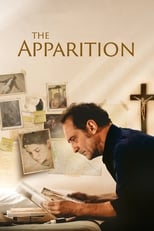Stephen Campbell
May 12, 2019
5/10
Very poorly structured
I had a discussion with my director of photography, Eric Gautier, before the shoot: you have to start by filming the appearances of reality to attempt to attain a state of grace, film the weight of bodies to reveal the soul. It's also why I needed to have contact with something of the chaos of the modern world to finish my film. I wanted to explore the intimate side of the topic in a wider context. I went to film in the biggest refugee camp in the Middle East on the Syrian border. This historic tragedy makes us question what we are, our values, our history, and what we are prepared to do to extend a helping hand to them.
- Xavier Giannoli; L'Apparition Production Notes
he has come across a world in which proof counts for nothing and the invisible world keeps its secrets.And this is essentially where the problem lies; the twist simply doesn't integrate with the rest of the film, and ends up working against the presentation of faith, diluting Giannoli's thematic concerns to the point where it's difficult to tell what he is trying to say. If the film is truly about the invisible world keeping its secrets, why does he feel the need to introduce a twist which thoroughly explains all of those secrets? Similarly, of the Congregation's work, Giannoli states,
one should not imagine that the Church hopes for and encourages the authentication of apparitions. On the contrary, I think they are a hindrance to them. Faith doesn't need proof or it's no longer faith.However, the film is literally about an attempt to find that proof, and once again, the twist compromises the apparent intention. Giannoli also refers to the film as
a thorough documentary investigation into the supposed proof of the existence of God.There's no evidence of this at all in the finished product, where perhaps some kind of engagement with the issues thrown up by, for example, agnosticism or noetics might have been interesting. And for evidence that films dealing with this kind of deeply esoteric/metaphysical subject matter can work, one need only compare L'Apparition with films such as Jessica Hausner's Lourdes (2009) or Dietrich Brüggemann's Kreuzweg (2014). In Lourdes, a woman (Sylvie Testud) confined to a wheelchair makes a pilgrimage to the Sanctuary of Our Lady of Lourdes, hoping to regain the use of her legs, and in the process engages with issues such as the Church as a profit-centred business, the nature of divine healing, and the role of vehement scepticism contrasted with that of blind faith. Kreuzweg tells the story of Maria (Lea van Acken), a fourteen-year-old girl from a fanatical Catholic family, whose only desire in life is to become a saint. With this in mind, she sets about replicating Jesus's path in Golgotha through the fourteen Stations. The film engages with a myriad of conundrums and challenges; an indictment of religious fundamentalism, the nature and power of obsessive faith, the likelihood or unlikelihood of genuine miracles, the place of divinity in the modern world, the Church's attitude to suffering, and the validity of secular interference in ecclesiastical matters. L'Apparition gets nowhere near this level of analysis. Instead, it's two hours plus of serious people acting seriously, but not actually saying anything of note about anything, capped off with as ill-advised a twist as you're likely to see all year.
